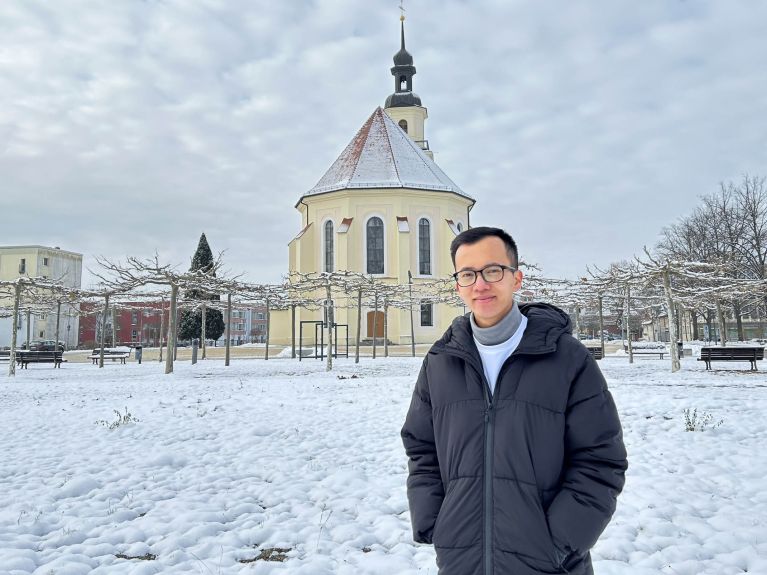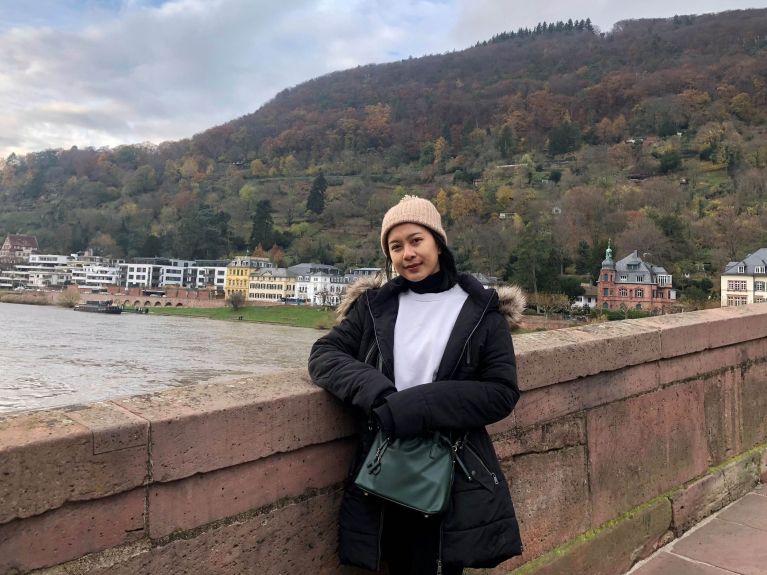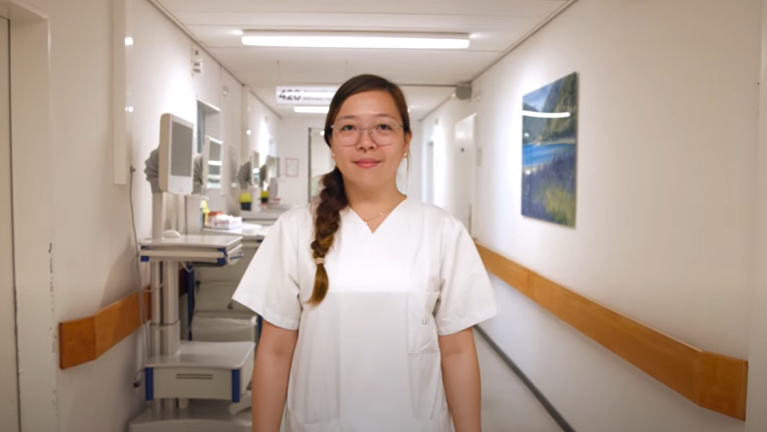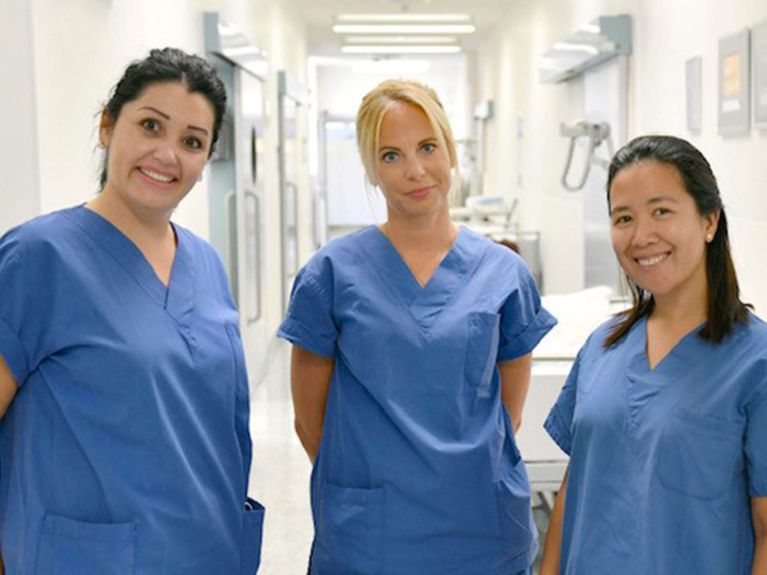A new future as a nurse in Germany
There is a shortage of around 150,000 nurses in Germany – a programme seeks to recruit them from Vietnam, Indonesia and the Philippines.

Some 150,000 additional nursing staff will be needed in Germany by 2025. It is a trend that has been emerging for years. For this reason, the Federal Employment Agency’s International Placement Services (ZAV) and the Deutsche Gesellschaft für Internationale Zusammenarbeit (GIZ) GmbH [KS1] place nurses from third countries in Germany through a joint programme which has been running since 2013.
The programme is called “Triple Win” and the name says it all: participants are offered career prospects in Germany, and the money they send back to their countries of origin helps give rise to key stimuli in the area of development policy in those countries. In addition, the programme relieves local labour markets in the countries of origin which are unable to absorb the surplus of skilled workers. The third aspect is to reduce the shortage of skilled labour in Germany.
Surplus of skilled labour in partner countries
Germany works with countries where there is indeed a surplus of skilled labour. In Asia, this currently applies to the Philippines, Indonesia and Kerala in India. Young people from Vietnam with previous experience in nursing are placed on a three-year nursing training programme in Germany – also with the aim of enabling them to get a job in Germany at a later stage.
Deutschland.de spoke to three programme participants – from Vietnam, Indonesia and the Philippines.
25-year-old Ngoc Dung Pham from Pleiku in Vietnam has been living in Germany since September 2021. He is training to be a nurse at Carl Thiem Clinic in Cottbus.
“I read about ‘Triple Win’ and the opportunity to train as a nurse in Germany on the internet. I come from a rural region in Vietnam and I didn’t have a job, so I was very relieved to be accepted onto the programme. I then took a ten-month German course at the university in Hanoi and passed the B1 exam. GIZ supported me financially. Even at this early stage, programme staff visited me regularly to ask if I needed any more assistance. After that, GIZ helped me get a visa and get settled in Germany. We were picked up at the airport and given an apartment. Our group from Vietnam also got help with opening a bank account and buying a SIM card. Our employer then provided us with all the furniture for the apartment, which I share with a flatmate, and they paid for us to take a language course in Germany, too.
I was a bit unsure at first: after all, the two cultures are very different. But I’d done a lot of research on the internet in Vietnam and watched the channel ‘Easy German’ on YouTube to get to know Germany a little in advance. But it’s not easy for me to connect with people here. I’m quite shy. However, I do have some friendly colleagues at the hospital, and I’ve been invited to barbecues and bowling evenings.
I’d recommend others not only to learn the language well, but also to familiarise themselves with the culture, too. In Vietnam people are more laid back, while in Germany they take things more seriously.
I particularly like the infrastructure in Germany, and the air here is very clean and fresh, too. We’re paid on time, and in Vietnam you can only dream of getting 30 days’ vacation. But I still miss my parents and my siblings. As I’m the eldest son, I feel responsible for looking after my elderly parents in later life. That's why I’m currently planning to stay in Germany for eight to ten years.
I’d recommend other applicants not only to learn the language well, but also to familiarise themselves with the culture. In Vietnam people are more laid back, whereas in Germany they take things more seriously – you have to be punctual, for example.”

Kharisma Ayu Susilowati, 28, has been working as a nurse at the Thorax Clinic in Heidelberg for five months. She originally comes from Solo in Indonesia.
“I’d been working as a nurse in Indonesia for almost six years when I found out about the position in Germany. I was fed up with my job and wanted a new employer where I could develop my career and enjoy a better work-life balance. I found the job in Heidelberg via the Instagram page BP2MI Indonesia. BP2MI is the official Indonesian institution that manages the ‘Triple Win’ project.

Dieses YouTube-Video kann in einem neuen Tab abgespielt werden
YouTube öffnenThird party content
We use YouTube to embed content that may collect data about your activity. Please review the details and accept the service to see this content.
Open consent formFirst of all I had to pass the recruitment process. That took about three months. I held professional qualifications that were recognised Indonesia – that’s one of the requirements for participating in the programme. But I still had to get my training certificate recognised in Germany. I then took a German course for nine months to obtain a B1 proficiency certificate. After that I had a successful interview with my employer in German. Through the programme I was then able to obtain a visa. This process took just one week. All in all, almost everything was handled online and the GIZ team supported me throughout the entire process.
Learning German – the most important step
The most difficult thing for me is the German language, and I miss Indonesian food, too, although you can buy a lot of Indonesian spices in Germany. I like the fact that everything in Germany is systematic and efficient, except perhaps Deutsche Bahn. And there are no restrictions on applications like in my home country, where sometimes a person’s age, appearance or religion are taken into account in the application process. I’d recommend to others interested in applying that they should be serious about learning German. Things are definitely more difficult if you don’t speak German.”

Eowyn Galvez, 36, is originally from the Philippines. She came to Germany from Makati ten years ago and initially worked in Frankfurt. She has been Deputy Head of the Cardiac Catheterisation Laboratory at Tübingen University Hospital since 2019. Since 2022 she has been giving specialist courses as a trainer for nursing professionals who wish to come to Germany through the the programme ‘Triple Win’}.
“I’d been planning to work in Europe for some time, initially trying to do so through a private agency and later through a Swiss programme. I wanted to go to a country where I could move around freely and feel comfortable as a woman. That’s why I’d already taken several German courses when I came across ‘Triple Win’ through the Goethe-Institut. GIZ then supported me with all the bureaucracy such as getting a visa and the process of having my qualifications recognised.
The way people work together in hospitals in Germany is very different from in the Philippines. In Germany there’s much more camaraderie among colleagues.
I’ve now been living in Germany for ten years and I’ve settled in well. But I do hate the winters here. When I saw snow for the first time, I was delighted. But now I know that sub-zero temperatures are not something I need. Apart from the warmer weather, I don’t really miss my home country that much. What is more, there are lots of Asian shops in Germany where I can buy the food I miss. And once a year I fly home to see family and friends.
Dieses YouTube-Video kann in einem neuen Tab abgespielt werden
YouTube öffnenThird party content
We use YouTube to embed content that may collect data about your activity. Please review the details and accept the service to see this content.
Open consent formThe way people work together in hospitals in Germany is very different from in the Philippines. In my home country, doctors are treated like gods – the hierarchy is very clear-cut. In Germany there’s much more camaraderie among colleagues. I particularly like the fact that there’s so much I can do here. I’m a nature lover and I enjoy going for walks and cycling. I once cycled from Tübingen to Paris. As a woman, I can go out alone at night, too. I’ve now even got German citizenship, I have a German partner and lots of friends, and I’d like to stay in Germany in the long term. My advice to other participants is: be open-minded, don’t be afraid to go out, and make an effort to learn the language.”
The Skilled Labour Immigration Act enables nursing professionals from abroad to work in Germany. It was amended in November 2023 to lower the previously applicable salary limits even further so as to provide opportunities for significantly more applicants in occupations where there is a shortage.



